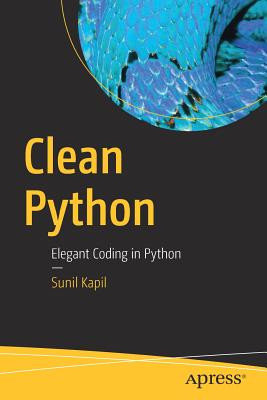Learning Python: Powerful Object-Oriented Programming, 4/e (Paperback)
暫譯: 學習 Python:強大的物件導向程式設計,第4版(平裝本)
Mark Lutz
- 出版商: O'Reilly
- 出版日期: 2009-10-12
- 售價: $2,020
- 貴賓價: 9.5 折 $1,919
- 語言: 英文
- 頁數: 1216
- 裝訂: Paperback
- ISBN: 0596158068
- ISBN-13: 9780596158064
-
相關分類:
Python、程式語言、Object-oriented
-
相關翻譯:
Python 學習手冊, 4/e (Learning Python: Powerful Object-Oriented Programming, 4/e) (簡中版)
已過版
買這商品的人也買了...
-
 深入淺出設計模式 (Head First Design Patterns)
深入淺出設計模式 (Head First Design Patterns)$880$695 -
 深入淺出 Java 程式設計, 2/e (Head First Java, 2/e)
深入淺出 Java 程式設計, 2/e (Head First Java, 2/e)$880$695 -
 SQL 語法範例辭典
SQL 語法範例辭典$550$468 -
 Linux 驅動程式, 3/e (Linux Device Drivers, 3/e)
Linux 驅動程式, 3/e (Linux Device Drivers, 3/e)$980$774 -
 C++ Primer, 4/e (中文版)
C++ Primer, 4/e (中文版)$990$891 -
 大話設計模式
大話設計模式$620$527 -
 深入淺出 Servlets 與 JSP (Head First Servlets and JSP, 2/e)
深入淺出 Servlets 與 JSP (Head First Servlets and JSP, 2/e)$1,200$948 -
 重構─改善既有程式的設計, 2/e (Refactoring: Improving The Design of Existing Code)
重構─改善既有程式的設計, 2/e (Refactoring: Improving The Design of Existing Code)$800$632 -
 Python 學習手冊 (Learning Python, 3/e)
Python 學習手冊 (Learning Python, 3/e)$880$695 -
 全球最強 VMware vSphere 4 企業環境建構
全球最強 VMware vSphere 4 企業環境建構$860$731 -
 Windows 7 哪裡有問題?-微軟沒講清楚的事
Windows 7 哪裡有問題?-微軟沒講清楚的事$480$408 -
 精通 Objective-C 2.0 程式設計 (Programming in Objective-C 2.0, 2/e)
精通 Objective-C 2.0 程式設計 (Programming in Objective-C 2.0, 2/e)$680$537 -
 Linux 驅動程式開發實戰 (Essential Linux Device Drivers)
Linux 驅動程式開發實戰 (Essential Linux Device Drivers)$750$638 -
 Google Android 2.X 應用程式開發實戰
Google Android 2.X 應用程式開發實戰$520$411 -
 鳥哥的 Linux 私房菜-基礎學習篇, 3/e
鳥哥的 Linux 私房菜-基礎學習篇, 3/e$820$648 -
 程式設計師的自我修養-連結、載入、程式庫
程式設計師的自我修養-連結、載入、程式庫$580$493 -
 Google!Android 2 手機應用程式設計入門, 3/e
Google!Android 2 手機應用程式設計入門, 3/e$530$419 -
 Google API 大全-程式設計、開發、實例
Google API 大全-程式設計、開發、實例$580$458 -
 Google Android SDK 開發範例大全 2
Google Android SDK 開發範例大全 2$890$757 -
 巧用 jQuery
巧用 jQuery$490$387 -
 約耳趣談軟體-來自專案管理的現場實錄 (Joel on Software: And on Diverse and Occasionally Related Matters That Will Prove of Interest to Software Developers)
約耳趣談軟體-來自專案管理的現場實錄 (Joel on Software: And on Diverse and Occasionally Related Matters That Will Prove of Interest to Software Developers)$490$417 -
 程式揭秘─從 C/C++ 程式碼探索電腦系統的運作原理
程式揭秘─從 C/C++ 程式碼探索電腦系統的運作原理$490$382 -
 深入淺出 Android 系統原理及開發要點
深入淺出 Android 系統原理及開發要點$450$351 -
 約耳續談軟體-探究軟體經營的根本實學 (More Joel on Software: Further Thoughts on Diverse and Occasionally Related Matters That Will Prove)
約耳續談軟體-探究軟體經營的根本實學 (More Joel on Software: Further Thoughts on Diverse and Occasionally Related Matters That Will Prove)$490$417 -
 嵌入式系統開發之道-菜鳥成長日誌與專案經理的私房菜
嵌入式系統開發之道-菜鳥成長日誌與專案經理的私房菜$850$723
商品描述
Google and YouTube use Python because it's highly adaptable, easy to maintain, and allows for rapid development. If you want to write high-quality, efficient code that's easily integrated with other languages and tools, this hands-on book will help you be productive with Python quickly -- whether you're new to programming or just new to Python. It's an easy-to-follow self-paced tutorial, based on author and Python expert Mark Lutz's popular training course.
Each chapter contains a stand-alone lesson on a key component of the language, and includes a unique Test Your Knowledge section with practical exercises and quizzes, so you can practice new skills and test your understanding as you go. You'll find lots of annotated examples and illustrations to help you get started with Python 3.0.
- Learn about Python's major built-in object types, such as numbers, lists, and dictionaries
- Create and process objects using Python statements, and learn Python's general syntax model
- Structure and reuse code using functions, Python's basic procedural tool
- Learn about Python modules: packages of statements, functions, and other tools, organized into larger components
- Discover Python's object-oriented programming tool for structuring code
- Learn about the exception-handling model, and development tools for writing larger programs
- Explore advanced Python tools including decorators, descriptors, metaclasses, and Unicode processing
商品描述(中文翻譯)
Google 和 YouTube 使用 Python,因為它具有高度的適應性、易於維護,並且允許快速開發。如果您想編寫高品質、高效的程式碼,並且能夠輕鬆與其他語言和工具整合,這本實作導向的書籍將幫助您快速提高 Python 的生產力——無論您是程式設計新手還是剛接觸 Python。這是一個易於跟隨的自學教程,基於作者及 Python 專家 Mark Lutz 的熱門培訓課程。
每一章都包含一個獨立的課程,針對語言的關鍵組件,並包括一個獨特的 測試您的知識 區域,提供實用的練習和測驗,讓您在學習新技能的同時測試自己的理解。您將會發現許多附註範例和插圖,幫助您開始使用 Python 3.0。
- 了解 Python 的主要內建物件類型,例如數字、列表和字典
- 使用 Python 語句創建和處理物件,並學習 Python 的一般語法模型
- 使用函數結構化和重用程式碼,函數是 Python 的基本程序工具
- 了解 Python 模組:將語句、函數和其他工具組織成更大組件的包
- 探索 Python 的物件導向程式設計工具,用於結構化程式碼
- 了解例外處理模型,以及編寫大型程式的開發工具
- 探索進階的 Python 工具,包括裝飾器、描述符、 metaclasses 和 Unicode 處理










